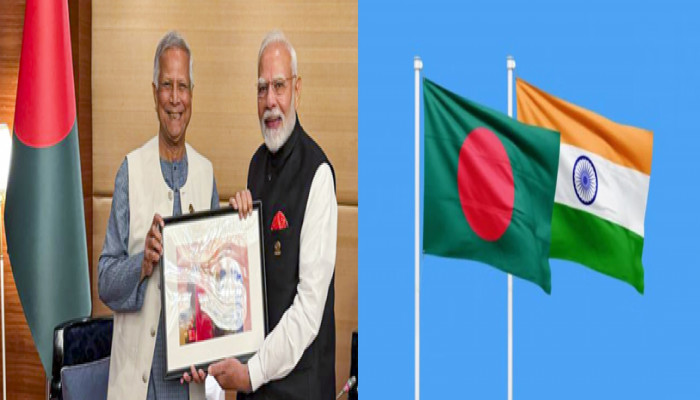'Avoid rhetoric, ensure safety of Hindus': Modi to Yunus in Thailand
- In Reports
- 04:03 PM, Apr 04, 2025
- Myind Staff
Prime Minister Narendra Modi met Bangladesh's Chief Advisor Muhammad Yunus on Friday during the sixth BIMSTEC Summit held in Bangkok, Thailand.
This meeting between the two leaders took place after Bangladesh had asked for a one-on-one meeting during the summit to resolve some issues. However, Modi’s official schedule in Thailand had not listed this meeting earlier. Relations between the two countries became tense due to disagreements over reported attacks on Hindu minorities in Bangladesh and India's decision to give asylum to Sheikh Hasina. The tension increased further after Yunus made a remark about India's northeastern states during his visit to the Boao Forum for Asia (BFA) annual conference in China.
During meeting, PM Modi expressed India’s concerns about the safety and well-being of minorities, including Hindus, living in Bangladesh, according to the Ministry of External Affairs. “PM Modi reiterated India's support for democratic, stable, peaceful, progressive and inclusive Bangladesh. He underlined Prof. Yunus India's desire to forge a positive and constructive relationship with Bangladesh. The PM also urged that any rhetoric that vitiates the environment is best avoided,” foreign secretary Vikram Misri said. “On the border strict enforcement of the law and prevention of illegal border crossing are necessary to maintain border security and security. The PM also underlines India's concerns over the safety and security of minorities, including Hindus in Bangladesh,” he added.
During a meeting, Bangladesh's Chief Adviser Muhammad Yunus gave Indian Prime Minister Narendra Modi an old photograph as a gesture of goodwill. This was their first official meeting since the Sheikh Hasina government was removed last August. The photograph was from January 3, 2015, taken at the 102nd Indian Science Congress in Mumbai. In the photo, PM Modi is seen awarding Yunus a gold medal.
According to Abul Kalam Azad Majumder, the Deputy Press Secretary to the Chief Adviser, the gift was meant as a friendly gesture. Despite the ongoing tensions, both leaders shared a smile and posed for a photo together. "Professor Muhammad Yunus is presenting a photo to Prime Minister Narendra Modi during their bilateral meeting in Bangkok on Friday. The photo is about Prime Minister Narendra Modi presenting a gold medal to Professor Yunus at the 102nd Indian Science Congress on January 3, 2015," the government of Bangladesh said.
Sources said that it was Bangladesh that requested the meeting between Yunus and the Prime Minister. Excitement had already started building after both were seen sitting together at the BIMSTEC leaders' dinner the night before. Their warm handshake and friendly interaction showed that both sides were trying to keep diplomatic talks open, even though some issues between them still remain unresolved.
Tensions increased recently due to Yunus's comments made in China. While visiting Beijing, he pointed out that Bangladesh holds a key position as the only route to the Indian Ocean for India's landlocked northeastern states. He encouraged China to boost its presence in the area. These remarks upset Indian officials, leading to strong reactions from both the Chief Minister of Assam and the Ministry of External Affairs. Although PM Modi hasn't directly commented on Yunus's remarks, he used the BIMSTEC platform to emphasise that India's northeast is central to the regional group. At the same time, External Affairs Minister S. Jaishankar highlighted India's position on regional cooperation, warning against selectively choosing partnerships.
Adding to the tension are recent reports of rising attacks on Hindus and Hindu temples in Bangladesh. India has also consistently rejected Dhaka's requests to extradite former Prime Minister Sheikh Hasina, further complicating diplomatic relations. Despite these tensions, PM Modi sent a letter to Yunus on Bangladesh's National Day, stressing the importance of mutual understanding and sensitivity.







Comments